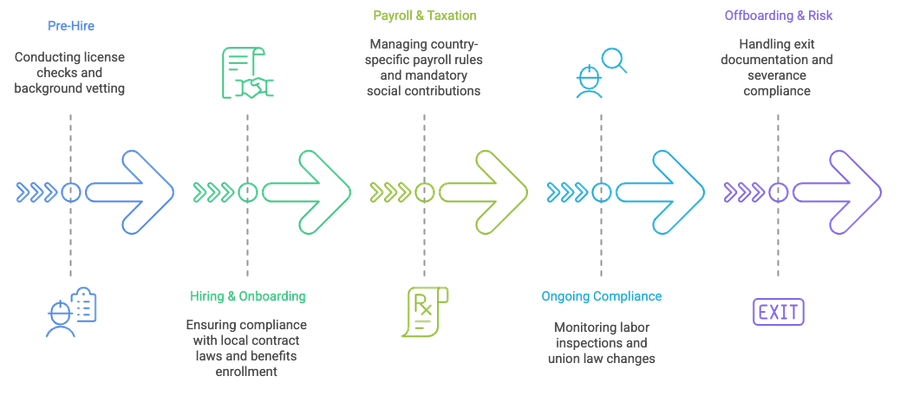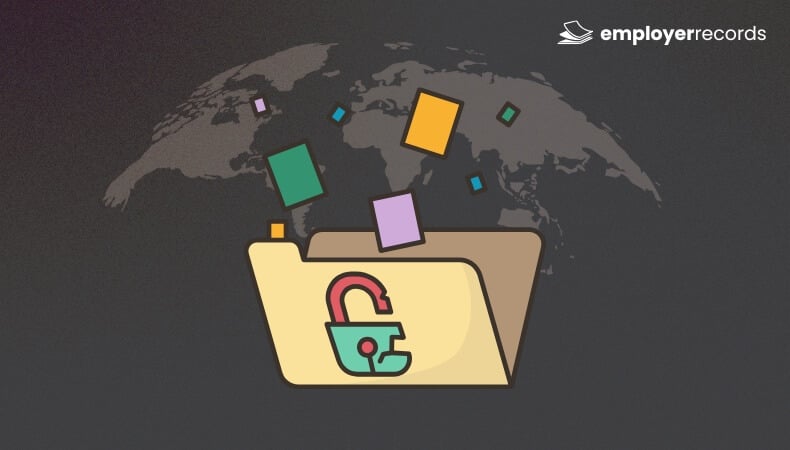Expanding globally sounds exciting, until legal paperwork, tax obligations, and compliance quirks slow you down. That’s where an Employer of Record (EOR) becomes an important partner.
Think of them as your behind-the-scenes HR partner: managing payroll, contracts, benefits, and legal requirements so you can focus on building your team and your business.
You get to hire in new countries fast, without the hassle of setting up local entities, and without putting your company at legal risk.
However, sectors such as healthcare and finance involve stringent rules regarding data privacy, licensing, and reporting that require specialized expertise.
Tech companies often need smooth platform integrations and contractor management, while the creative and construction industries demand flexible classification and payroll models.
Selecting an EOR with proven experience in your field enables you to solve real hiring headaches, whether it’s license validation in healthcare or contractor misclassification in tech.
In the following sections, we’ll explore key criteria, from regulatory know-how and tailored services to tech integration and transparent pricing, to guide your selection.
Key Takeaways
- Generic EOR providers may offer compliance coverage, but without deep industry expertise, they often miss critical regulatory nuances, putting your business at risk of misclassification, fines, or operational delays.
- When evaluating EOR partners, focus not just on country coverage, but on sector-specific experience, integration capabilities, and transparency in pricing and risk-sharing terms, especially if you’re scaling across complex regions.
- EORs with localized compliance knowledge, integrated tech stacks, and a focus on employee experience can reduce friction, ensure legal protection, and improve retention for globally distributed teams.
Understand Your Industry’s Regulatory Landscape
Every industry comes with its rulebook, and when you’re hiring globally, those rules can change dramatically from one country to another. Evaluating an EOR’s capacity to navigate these variations is non‑negotiable.
Why Industry-Specific Compliance Matters?
Compliance mistakes in high-stakes sectors like healthcare and finance aren’t just paperwork errors; they can trigger lawsuits, license revocations, or bans from operating.
For example, failing to verify a nurse’s credentials in Germany could halt hospital staffing operations overnight. In fintech, a misstep in AML compliance could draw regulatory scrutiny across multiple jurisdictions.
Industry Experience And Relevant Track Record
Providers who’ve navigated sector-specific hurdles, like negotiating labor unions in Brazil or meeting licensing audits in Australia, bring practical shortcuts and real-world foresight.
Ask for outcomes, not just logos: Did they help a biotech scale post-clinical approval? Can they show how they kept a crypto startup compliant amid shifting regional laws?
Geographic And Regulatory Footprint
Ensure your EOR supports all your target markets with depth, not just breadth:
- Coverage must not only span countries, but also offer local legal entities or trusted in-country partners with consistent execution capabilities.
- For industries requiring deep localization (e.g., finance, healthcare), providers must possess specialized legal advisors tailored to local labor rules, tax regimes, and benefit structures.
Action: Verify region-specific compliance workflows and local resource availability aligned with your operational geographies.
Coalition Of Services: Tailored To Industry Workflows
Not every EOR can meet complex, sector-specific needs. Leading providers now offer bespoke services, fine-tuned to match industry workflows, scale-of-hire models, and HR demands.
Tailored Onboarding And Contracting
Strong EORs develop workflows customized for different workforce types:
- Short-term contractors or project-based consultants in tech, creative, or energy sectors.
- Full-time hires in highly regulated industries like healthcare or financial services require licensing verification.
They ensure contracts, visas, and documentation are aligned with both local law and your internal protocols, reducing administrative friction across jurisdictions.
Industry-specific Payroll & Benefits
EORs cannot rely on a “one-size-fits-all” approach. Providers such as Payrolus and TCWGlobal tailor benefits packages to local markets and industry expectations, offering health insurance, retirement plans, wellness programs, or profit-sharing where regulated or customary.
For consulting, IT, or contractor-heavy companies, classification of workers, variant pay cycles, and complex bonus or equity payouts are handled accurately and compliantly.
Full HR Lifecycle Integration
Beyond payroll and benefits, comprehensive EORs manage HR workflows:
- Employee performance issues, renewals, and terminations are handled according to both industry practice and local regulations.
- Data privacy and IP agreements account for sensitive employee data or trade secrets common in tech, pharma, and finance sectors.
Flexible Staffing Models & Scaling
Tech and project-based industries often require rapid scaling, adding or removing talent as needed. Flexible employment options, such as temporary, contractor-to-hire, or hybrid arrangements, can be supported without extra entity setup.
Platforms like Skuad and Worksuite automate or support zero-friction worker classification and onboarding workflows.
Technology-Enabled Service Delivery
Best-in-class EOR providers leverage AI-driven automation, digital onboarding, and real-time analytics:
- Automated payroll and compliance updates reduce manual errors and regulatory lag.
- Employees enjoy smooth digital onboarding, e-signature contracts, and clear dashboards.
- Employers gain access to dashboards tracking payroll costs, compliance flags, and workforce metrics in real time.
Tech That Fits: Why Seamless EOR Integration Is Non-Negotiable
A good EOR platform should feel like an extension of your HR team, not another system to babysit.
Whether you’re using Workday, BambooHR, or Deel, the platform should plug into your existing stack with minimal fuss. Think real-time dashboards, automated workflows, compliance alerts, not spreadsheets and data re-entry.
But it’s not just about convenience. Without proper integrations, your payroll team could be spending hours reconciling reports or manually updating records across systems. That’s a time sink and a compliance risk.
Look for tools that offer open APIs, multi-country payroll sync, and user-friendly interfaces for both HR managers and employees. If your platform still feels like 2012, it’s probably not going to scale with your business in 2025 and beyond.
Hidden Costs Kill Trust: What to Ask Before You Sign
No one likes to be surprised by hidden fees, especially your finance team.
Some EORs advertise low base rates, only to introduce add-ons for benefits, terminations, or standard compliance services. Over time, these hidden fees can double your cost per hire.
Make sure the provider lays everything out clearly: monthly per-employee rates, onboarding fees, offboarding costs, local taxes, benefits administration, all of it. Ask what’s included, what’s optional, and what could fluctuate.
And if they hesitate or gloss over the details? That’s a red flag. Transparency upfront saves tension (and budget overruns) later.
Who Holds the Risk? Legal Protection & Insurance in EOR Deals
If you’re relying on an EOR to keep you compliant, you’d better make sure they’re built to absorb risk, not just deflect it back to you.
The best providers have strong indemnification clauses, local legal teams, and insurance in place to cover employment disputes or classification issues. If something goes wrong with taxes, terminations, or contracts, you need to know they’ll handle it, not leave you holding the liability.
Don’t be afraid to ask hard questions: What happens if an employee files a wrongful dismissal suit? Who handles local audits? What’s covered by their insurance?
A reliable EOR won’t just keep you compliant, they’ll keep you protected.
EOR Compliance Journey

Why Employee Experience Still Matters in EOR?
Your team might be technically employed by the EOR, but to them, they’re still part of your company. And how they’re treated matters.
Great EORs offer onboarding in local languages, understand cultural norms, and ensure timely support. Whether it’s resolving a payroll query in India or explaining leave policies in France, responsiveness and empathy go a long way.
On the flip side, a slow or indifferent provider can hurt morale and even retention. If your employees feel like they’re stuck in a bureaucratic loop, that frustration can reflect poorly on your brand, even if the EOR is technically to blame.
So don’t just assess the tech or the legal side, dig into how the EOR treats people. Because at the end of the day, that’s what your employees will remember.
Support Structure & Service Quality
Strong support structure and service quality are critical markers of a professional EOR provider. Excellent support includes fast, clear responses, knowledgeable staff, and troubleshooting aligned with your company’s needs.
As global employment setups are inherently complex, spanning multiple jurisdictions, employment types, and compliance requirements, being confident that questions and issues are addressed promptly and accurately is essential.
Speed and relevance of responses can make or break engagement in regulated sectors:
- 24/7 support, dedicated account management, escalation protocols, and industry-savvy HR advisors should be baseline expectations.
- Look for SLAs communicated in writing, with available case studies showing real-time support performance.
Action: Understand your support needs, such as time zones, languages, complexity, and gauge the provider’s responsiveness.
Reputation, Awards & Analyst Recognition
Industry recognition provides a powerful indicator of an EOR’s leadership in both innovation and execution. When a provider consistently earns top placements in respected analyst reports or wins sector-specific awards, it signals trustworthiness and long-term stability.
Independent recognition signals stability and leadership:
- Providers rated by analysts such as Gartner, Forrester, or Sovereign Trust, or winners of industry or regional awards, are more likely to offer quality aligned with industry standards.
- Long-standing providers with public reviews (G2, Capterra) and recognized clients in your domain offer additional comfort.
Action: Ask for third-party analyst documentation, benchmark ratings, and verify client references.
Quick Comparison Table
| Evaluation Criteria | Why It Matters for Industry Fit |
| Industry-specific compliance track record | Ensures understanding of sector regulations |
| Service customization & support | Meets unique workflows like licensing, contracts, and benefits |
| Platform integration & data security | Supports efficient operations and ensures confidentiality |
| Transparent pricing | Avoids surprise costs in complex regulatory environments |
| Risk and insurance coverage | Protects against data breaches, misclassification, or malpractice |
| Employee experience alignment | Supports cultural norms, retention, and brand consistency |
| Reputed track record & recognition | Builds trust for long-term strategic partnership |
Best Practices: Pilot Testing & Vendor Comparison
Conducting a pilot test with one or two hires gives real-world insights into service delivery and support. An effective pilot helps you assess onboarding reliability, compliance workflows, platform usability, and communication responsiveness in a controlled setting.
Comparing multiple vendors using a structured scorecard based on pilot outcomes ensures objective selection and helps align the final choice with your industry-specific requirements.
- Conduct a tightly scoped, two-to-four-week pilot using a realistic hiring scenario to evaluate service delivery reliability.
- Define clear success metrics, such as onboarding speed, payroll accuracy, compliance adherence, and support responsiveness, to assess pilot results accurately.
- Compare vendor performance based on actual pilot outcomes, integration ease, communication effectiveness, and platform usability insights.
- Use a structured scorecard to rate vendors across compliance, tech integration, service quality, cost transparency, and employee experience.
- Gather feedback from internal stakeholders and pilot users evaluating the onboarding journey, support interactions, and overall satisfaction experience.
- Request customized proposals including compliance workflows and cost breakdowns tailored to your industry and scale forecast.
Sector-Specific Considerations
Different industries place unique demands on employer‑of‑record providers, from healthcare’s licensing and patient‑privacy obligations to retail’s seasonal staffing and high turnover management.
Understanding these sector‑specific challenges ensures you select an EOR equipped to support industry compliance, workforce flexibility, and operational effectiveness.
- Healthcare & Life Sciences: EOR handles medical licensing, credentialing, patient privacy data compliance, and manages credential verification across jurisdictions seamlessly.
- Financial Services: EOR ensures strict AML, SOX, SOX GDPR compliance, secure payroll, and manages professional certification tracking for regulatory standards.
- Technology & Software: EOR enables rapid global hiring, contractor-to-employee classification, IP protection, data privacy regulation alignment, and seamless onboarding scalability.
- Manufacturing & Engineering: EOR supports labor safety compliance, shift scheduling, union agreements, project-based staffing, overtime rules, and temporary workforce management.
- Construction & Events: EOR manages seasonal workforce fluctuations, contract classifications, varied pay schedules, labor laws compliance, and regional staffing flexibility.
- Retail & Hospitality: EOR handles high turnover staffing, benefits scheduling, multilingual support, seasonal scaling, and ensures workforce compliance across locations.
Conclusion
Choosing the right EOR isn’t just a legal formality; it’s a bet on your company’s ability to grow globally without breaking things. With the right partner, you’re not just hiring across borders; you’re building a global team that feels local, protected, and valued.
Look for real experience, real tech, and real transparency. Because in a world where regulations shift fast, trust and execution matter more than ever.
Beyond compliance, such a partner offers customized onboarding workflows, benefits packages, and HR services designed for your specific needs.
Their technology infrastructure connects seamlessly with your systems, providing real-time dashboards, automation, and accurate payroll that scales with your operations.
Transparent pricing structures prevent unexpected costs, even in high-regulation environments, while comprehensive insurance and liability provisions protect your business from industry-specific risk.
Moreover, they handle employee interactions with professionalism and cultural sensitivity, and third-party recognition or industry reputation builds trust from day one.







